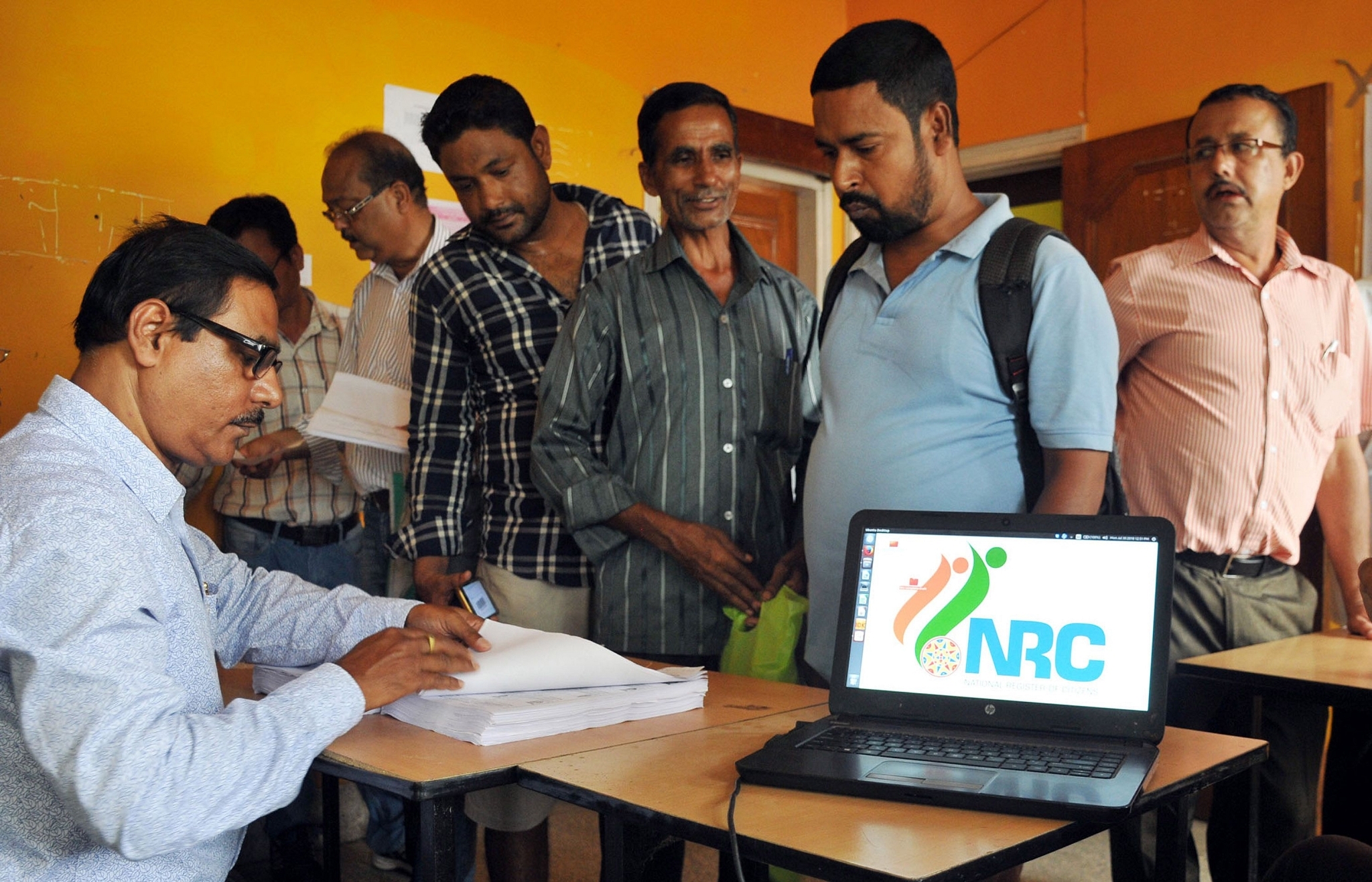News Brief
As Different States Plan Assam-Style NRC Exercise To Filter Out Illegal Immigrants, Here Is A Word Of Caution
- Instead of a quick implementation of NRC as a political gesture, the government should mull a well-thought out plan to tackle the challenge of illegal immigration

People check their name on the final draft list of the state’s NRC list at NRC Seva Kendra at Hatigaon on 30 July 2018 in Guwahati, India. (Rajib Jyoti Sarma/Hindustan Times via GettyImages)
On 16 September, Haryana chief minister Manohar Lal Khattar announced that the state will implement an Assam-style NRC to weed out illegal immigrants. Khattar reportedly acted on the advice of former chairman of State Human Rights Commission Justice (retired) H S Bhalla.
“When I was heading Haryana State Human Rights Commission, many times reports about anti-social elements, who may be outsiders, came to may notice. So I suggested that such anti-social elements should be identified,” Justice Bhalla was quoted as saying.
Justice Bhalla further said that he will go to Assam to study different aspects of the NRC. After examining the issue, Justice Bhalla may submit a report to the government which may be considered for further action.
While the Assam NRC was carried out in accordance to and under the supervision of the Supreme Court, respecting the Assam Accord 1985, the challenge of illegal immigrants has been a key issue of the current Bharatiya Janata Party-led government.
Apart from tightening the border security at the porous borders with Bangladesh, the government has categorically stated that it wants to rid the country of illegal immigration.
The issue of illegal immigration in India is also deeply connected with criminal and anti-national activities. Smuggling of goods and livestock, sex-trafficking, counterfeit currency, narcotics trade as well as terrorist activities by infiltrators led the Delhi High Court ruling that the illegal Bangladeshi immigrants "pose a danger to India's internal security".
Challenges
Before embarking on an NRC process, it is important to learn and digest the lessons from Assam NRC. The exercise will take up significant resources of the state, and exclusion and inclusion errors have significant costs, therefore, the exercise needs to be done carefully.
A major challenge with different states conducting separate NRC process is that the illegal immigrants can escape the process by moving to a different state for the time being.
Many illegal immigrants are also able to get documentations with false information. The NRC process is also long-drawn and cumbersome, with the appeal process going from tribunals to the High Courts to the Supreme Court.
An effective NRC process would require a nationwide integrated approach and a long-term plan of nabbing, detaining and eventually deporting the illegal immigrants. India should initiate discussion with neighbouring countries, especially Bangladesh for an agreement over quick and easy repatriation of convicted illegal immigrants. This can be done at a bilateral or multilateral level.
When the house is flooding, the first step should be to close the faucet. India has already enhanced its border security, but the issue of deep rackets, most likely running with political patronage, remains.
One such inter-state racket was unearthed to be operating from Kolkata to Kerala, wherein the illegal immigrants travelled from Kolkata to Kochi via Hyderabad. By the time they reached the port city, they had all the required documents to set out for destination countries like Australia, Canada to European countries like Serbia.
Another important issues is of foreigners fleeing persecution taking refuge in India. Reportedly, a lot of those excluded from the Assam NRC are Bengali Hindus who were forced to flee their homes due to Islamist violence.
Similarly, a lot of Pakistani Hindu and Sikh refugees remain in India who fled terrible religious persecution in their country of birth.
The current NRC process is blind to these issues and puts these people who face a threat to their lives in their home-countries on the same pedestal as those crossing over for economic/criminal purposes.
Therefore, instead of a quick implementation of NRC as a political gesture, the government should mull a well-thought out plan to tackle the challenge of illegal immigration.
Political parties should come together on issue of illegal immigration given that in a heavily populated developing country, the worst hit by the illegal immigration are those in the low-income strata whose jobs are taken away by the illegals.
The debate on illegal immigration should break out of the binary of ‘illegal immigrants versus no outsiders’ to one between illegal and legal immigration. Former poses demographic as well as security threat, while later can be used by India to become a talent-absorbing sponge in the subcontinent.
Starting with strengthening the border security and curbing the rackets who facilitate it, the government should pursue a Memorandum of understanding with Bangladesh over repatriation, and pass a refugee law that protects those fleeing rampant religious persecution at the hands of Islamist forces in the subcontinent.
All this should be accompanied by rigorous statistics maintained by the state on illegal immigration. A hasty NRC process for the namesake will do more harm than good.
Support Swarajya's 50 Ground Reports Project & Sponsor A Story
Every general election Swarajya does a 50 ground reports project.
Aimed only at serious readers and those who appreciate the nuances of political undercurrents, the project provides a sense of India's electoral landscape. As you know, these reports are produced after considerable investment of travel, time and effort on the ground.
This time too we've kicked off the project in style and have covered over 30 constituencies already. If you're someone who appreciates such work and have enjoyed our coverage please consider sponsoring a ground report for just Rs 2999 to Rs 19,999 - it goes a long way in helping us produce more quality reportage.
You can also back this project by becoming a subscriber for as little as Rs 999 - so do click on this links and choose a plan that suits you and back us.
Click below to contribute.
Latest